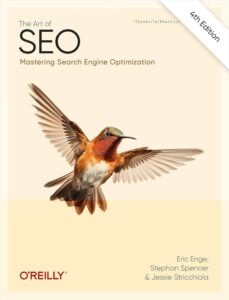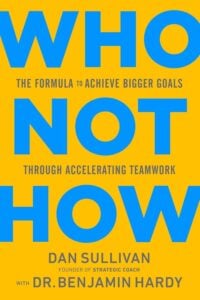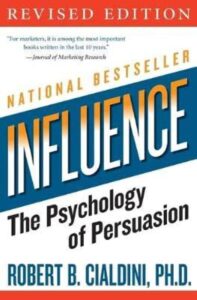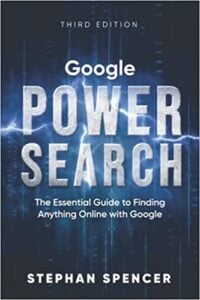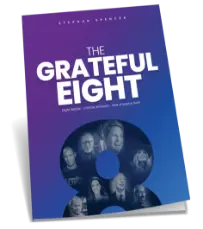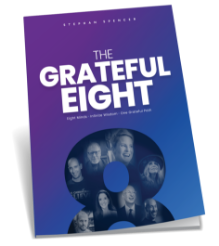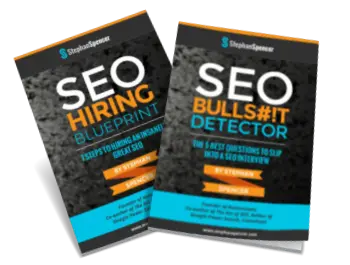Global Innovation Virtual Tours
We could start with SEO because that’s what I’m most known for. I have a huge book on the topic. There are 994 pages that I’m co-author of The Art of SEO. And yeah, it’s pretty straightforward to think in terms of SEO as having three pillars. Those three pillars are content, architecture, and links. If you think about your website as a destination you could think of it as a tree in a forest, a very large forest with billions and billions of websites, and trillions of URLs on the internet.
So you’re competing with a lot of competition out there. But if a tree falls in a forest and no one hears it, does that tree make a sound? What’s the answer to that one? What do you think?
Yeah, but nobody knew.
So the answer is it did not make a sound. It made a vibration, but there was no ear to convert that vibration to a sound.
If you built a website and nobody can see it on the internet, find it. It just sits there in the middle of the forest, nobody is visiting it. It was a waste of time. So you need to have a channel for folks to get to your website so you can share your brilliance. You can share your wisdom, your services, and products and change the world.
SEO provides that framework. The three pillars of this framework are content, architecture, and links. If you don’t have great content, then what’s for people to even consume what’s there for the search engines to consume and index and rank? If you haven’t figured out what the right keywords are that people are searching for, that’s part of that content pillar.
Let’s say everybody is talking about one thing in one way, and you’re talking about it in a completely different way, that’s two different worlds, same planet, different worlds. So you’re not you’re not connecting with them in the language that they use with their terminology. If they’re referring to custom and you’re talking about bespoke or vice versa.
There’s a mismatch there. Knowing what people are searching for is really helpful for determining your editorial calendar, navigation structure, taxonomy, and everything else you do from a content creation standpoint, including videos and FAQs (frequently asked questions) need to start with a foundation of what people are searching for.
Good keywords are popular with searchers. They’re relevant to your target market, not just to you and your business, but to your target market, right? You can have keywords that are not relevant to you as the website owner but are relevant to your ideal target avatar, and that could be perfect, right?
Let’s say that you are selling baby furniture, baby bassinets, and cribs. And those are obvious keywords. What if you want to expand your reach and go after more expectant parents than just those typing in those few keywords? You might consider baby names because who’s searching for baby names?
Only expectant parents. So that’s a brilliant keyword opportunity, and it’s a much larger opportunity too, because the search volume for that is orders of magnitude more than baby furniture and baby cribs. And you might think I sell baby furniture, how am I going to monetize baby names? That doesn’t make sense.
I don’t sell baby names, but you’re offering value. To these people, these expectant parents, maybe baby name meanings or trends or cute baby names clever thought like thoughtful or beautiful baby names. I don’t know. You’re giving them some value and then you’re soft selling them maybe with an essential nesting checklist, all the things for the baby’s new room.
And that is how you build a list. That is how you target your exact ideal audience market without having to just rely on paid search and paid social. Cause the moment you stop delivering, the moment you stop paying for that. Paid traffic is the moment you stop receiving that paid traffic, but with organic SEO, you are building an asset.
So that means that if you built links and you got great content out there and everything and people are coming to your site from Google searches, that doesn’t go away. That’s not paid or advertising. It’s an asset. That continues to give you dividends month after month, year after year. So back to those three aspects of a good keyword, which is part of that content pillar.
It’s popular with searchers. It’s actually some search volume for that keyword that’s relevant to you, at least your target audience, if not your business as well. And then finally it’s attainable.
You can rank on page one for it because if you’re on page two, you’re invisible. How many of you go to page two and Google anyone?
It’s a small single-digit percentage of folks. The old joke, the best place to hide a dead body page two in Google. So popular, relevant, and attainable. Those are the three attributes of a good keyword. So now if we move from the content pillar to the links pillar, does anyone want to share a website address with me that could be your own site?
It could be a competitor site. It’s fine either way, but I can pull up.
I think if you tear apart the Silicon Valley Inspiration Tours site.
Okay. Drop the URL into the chat.
Okay, perfect. So here, I’m going to share my screen and I’m going to show you how easy it is to tell what the authority scores of a website are. It could be you, your site, it could be a competitor’s, it could be a friend’s, it doesn’t matter. So I’m going first to show you a tool called Majestic.
I’m going to put in the full domain without any subdomain like www without the https and so forth because I want the full domains, authority, and trust scores. And you can see that your trust flow is an 11 out of a hundred. That’s pretty small because when you take into account how this metric is calculated, logarithmic scale.
An 11 out of a hundred is not 11 percent of the way to a hundred. It’s if you think of a mountain. It’s at the base of the mountain still. The easiest way to describe that is with a picture, because a logarithmic scale, I can explain by words, but a picture says a thousand words. So let’s see what that picture looks like.
This is on a logarithmic scale as well. This is a 0 to 10 log scale, but yeah, it can just extrapolate. So this seven out of 10 is at the top of this inset, but it’s at what still kind of base camp of that mountain, the green section of that mountain, That’s a seven out of 10. So you’re 11 out of a hundred for trust flow shows that you’re not very trusted.
You’re way down here at the base of the mountain. Got some work to do. And until you improve these scores, Google’s going to see your site as being not very trustworthy. That’s your Achilles heel right now. I don’t know what else I could find in this hour digging into your site,
Is this site trustworthy for Google? What is this trustworthiness about?
Check out this article I wrote for Search Engine Land, it goes into some detail about this topic.
There’s an article called “There’s no shortcut to authority“. Why you need to take EAT seriously. EAT stands for expertise, authoritativeness, and trustworthiness. That’s a Google acronym. Google came up with that. They put it into their Google quality raters guidelines, quality raters, these human reviewers that work for Google as contractors rate websites, millions of websites.
So that the machine learning algorithm has some training data to use to figure out what is a trustworthy website and what is an authoritative website. What does an author with expertise look like compared to one who doesn’t? So if AIs can do it then that makes it a lot more scalable right now.
They’ve got an army of humans who are providing these ratings to The machines as training data. This is a key component. And the section here in the article, I go into some detail about it. There’s trust flow as one metric that measures it. Another is Link Research Tools have a metric called LRT trust.
And the idea of this is if you are getting a link from just a random website, Jim Bob’s personal homepage, it’s probably not worth a lot. If you get a link from CNN, it’s going to be worth a heck of a lot more. And that just makes intuitive sense. So it’s not a democracy in terms of SEO. It’s a meritocracy.
Jim Bob doesn’t get the same voting power as CNN because CNN does a lot more fact-checking. CNN has editorial guidelines and they have a huge newsroom full of people. And they’re producing content at orders of magnitude scale compared to Jim Bob. So it makes sense that. Some sites get a lot more authority, trust, and power than others.
So that’s how it works, but how do you increase your trust? How do you get more trust flow or LRT trust, which then is a good proxy for knowing that Google is trusting your site more because Google has its internal metric. It’s not using Majestic’s trust flow to calculate how trusted you are.
It’s doing its thing inside its algorithm. If you want more trust, you should get high-trust websites to link to you. It may be difficult to get a site that’s a CNN. com type of quality of site to link to you, but imagine if here, I’ll give you an example. Imagine if you were a love coach, like my wife, Orion, she has a love coach and you get some PR, and you get written up on the Tinder blog.
Do you guys know about Tinder? Have you heard of Tinder? Yep. Okay. I’ve never used it. So this is an article on their Tinder on Tinder blog called “Swipe Life” instead of “Swipe left”. It’s funny. Five ways to make the people you’re dating feel special, whether or not you’re exclusive.
And one of the subject matter experts. Life coach, Orion Talmay, that’s my wife, with a link to her homepage. Yay. And that link is valuable. It’s not just a Jim Bob. This is Tinder.com. This is a big deal.
Another very powerful example. Askmen.com. Has anyone heard of that site?
Anyone? Nope. It’s a pretty popular website.
Here’s an article on AskMen. Why we kiss under the mistletoe and, how to do it right this year. As if you did it wrong the year before. With a quote from relationship expert and life coach, Orion Talmai. And she gives a quote and everything. So that single link made a difference. Just that one link.
If you look at the metrics, look at this. Askmen.com has a trust flow of 73 out of 100. That’s pretty good. That’s pretty darn good. So if you can be selective, think in terms of the 80/20 rule, the Pareto principle, right? You’ve got the trivial many, but you’ve got the vital few, and that’s where you should be focusing.
Your energy is getting the vital few. Yeah, you could get a thousand links, but they’re probably all garbage. If you focus on the vital few you get links like I just showed you, Askmen.com and Tinder.com that can move the needle big time. So that’s the links pillar of SEO, getting folks to link to you.
Think of it as you’re running for President or Prime minister or whatever, I don’t know whatever offices you can vote for in your country, and not everybody gets the equal kind of vote. Some people are the equivalent of super delegates and they get massive amounts of voting power and other people get less.
It makes sense to go after those that have the most voting power.
How long does this work? So how many times would you have to be quoted on highly trusted pages? Because I guess it doesn’t make sense if I’m quoted in 2015 for the next 50 years.
Yeah, so if you could get I don’t know, a handful of links a month, in addition to the ones that you’ve already garnered in the past, that would be really good.
Unless you’re a big company, you’re going to have to up the ante quite a bit more, but a small business or small organization. They’re just a handful of extra links a month can make a lot of difference if they’re the right links.
How about something like medium?
Yeah. So Medium.com is not it’s not that valuable because Google understands that anyone can publish there. There isn’t an editorial manager who vets the content. It’s not the Huffington Post or Thrive Global or Entrepreneur.com where there is vetting involved. Anybody can spin something up on Medium and publish stuff. And so it’s not that different from getting published on Blogspot.com or some random blogging platform.
If you built a website and nobody can see it on the internet, find it. It just sits there in the middle of the forest. Nobody is visiting it. It was a waste of time.
And it doesn’t make a difference if the blog has a lot of views.
It probably does make a difference, but that wouldn’t be my preferred starting point, I would want to go after sites that have a lot of trust and authority and not just a blogging platform or that’s essentially what medium is.
So I’ll give you an example. I worked really hard to get a link and an article in the Harvard Business Review. You can see, I even put the logo on my homepage. I was so proud of getting that article published there and HBR. So when you get an article with a link and it’s published on a high-trust website, like HBR, I just think of who’s trusted Stanford University, Oxford, Cambridge, MIT, Harvard, of course. FirstGov in the States. CERN in Switzerland. National Science Foundation, PubMed, WebMD. These are super high-trust, high-authority websites. It’d be really hard to spam your way into Harvard Business Review, right? You can’t create some garbage article and submit it and get published in Harvard Business Review.
Then the amount of back and forth I had to do with the editor at HBR to get published. Insane. I’ve never had to do so much work to get an article published. Here’s that article, by the way, How to make any business trip less boring. The first article I submitted was really good. Solid. It was really good, but they said it’s no different than any other article you’d see on a site like Forbes or Entrepreneur or Inc. or Fast Company.
They don’t take those kinds of articles. It has to be an article that you’d only expect to see on HBR. I’m like, what? Okay. So back to the drawing board, they wanted something counterintuitive, something that kind of goes against the grain, goes against conventional wisdom and I had to gut the article and start all over again.
They were happy with it after I finally finished it and looked at how I was able to get a link. Here’s my little byline at the bottom. And this link here goes to my website. This other link goes to Amazon, which doesn’t help me. So that’s how you do it. You get articles published, you do PR, and you contribute resources to sites here’s one that was pretty cool.
It’s a bunch of resources relating to trace routes and all sorts of IP address lookups and things like that. I thought it was in my history, but it’s not. The idea there is it’s a big resource list and my client’s tool was not in there. WhatIsMyIPAddress.com is one of my clients. I’m like, I should suggest that they add this tool because it’s really valuable.
It does IPV6 lookups, not just IPV4. And I emailed the webmaster. His email address was at the bottom of the page. And he said that’s great. I like it. I just added it. Boom. That was easy. So my client just got a Stanford.edu link. So that’s the links pillar. And then the final pillar of SEO is architecture.
And I’m not just talking about navigation structure or taxonomy. I’m talking about all the geeky stuff, the things that would probably make your head hurt or have your eyes glaze over things like XML sitemaps, robots.txt, schema.org, hreflang tags, canonical tags,and duplicate content. Using third-party crawlers, like Screaming Frog and or deep crawlers to crawl your site like this sort of stuff would make your head hurt.
Therefore, don’t do it yourself. Hire somebody to do it for you. Somebody who’s really good at SEO who you know, at least read the book on the topic, if not wrote it.
Let me give you a couple of examples.
If we go to Silicon Valley Innovation Tours again and pick instead of a page that you’ll just find by clicking around and perusing the site, we’re going to go directly to the robots.txt file. It’s pretty much only the spiders who go to the Google bots and Bing bots and all that.
Here it is. It looks pretty geeky. You might think, okay, why do I need to know this? You don’t need to know it, but somebody needs to know that.. For example, this line is there because that’s good. Not having that line with the sitemap directive means that you would have to submit the sitemap URL.
Inside of Google Search Console and inside of Bing Webmasters Tools. If you don’t have to do that because you’ve included it here in this robot.txt file that eliminates something that would have to be done by you as an additional hoop to jump through. So all this sort of stuff can be checked.
Could go look at the sitemaps file? Let’s do that. This is called an XML sitemap. It’s generated by a tool. Yoast SEO plugin for WordPress blogs can be created as an example. This one is a sitemap index that lists others. Site maps within it. So let’s pick the pages sitemap and you don’t need to know this, but I’ll just tell you that priority is ignored by Google. You don’t need that. And all this geeky stuff you don’t need to know.
You just need to know to hire the right one. There’s a book called Who Not How just published by “Dan Sullivan” and “Ben Hardy”. Finding the right who is the secret to success. The who that’s going to figure out the how for you or already has the how you don’t need to know that this is a waste here having the priority field and the fact that it’s the same priority is funny to all of these pages have exactly the same priority.
That makes no sense. So going back to the homepage again, just to show you something else. SEO is about increasing your rankings and your traffic from Google. But then there’s another thing that goes hand in hand with SEO. And that’s conversion. That’s getting people who are already on your site to take the next action that you want them to take.
A lot is going on here. There’s a lot going on and it’s hard to read all of it because of the busy background and everything, and the partial transparency. This makes it difficult for a person to do business with this organization. Any kind of distraction, any kind of additional hoops you make people jump through any kind of difficulty and reading or consuming or understanding the content or lack of clarity or additional distractions, all of that stuff.
Just posted in the chat the beta of the relaunch of the website that’s going to be.
Oh, great. That’s fun. Okay, let’s have a look. 2020 V2 is a little behind schedule. Often that happens.
All right. So the cardinal sin for conversion is to put a distracting animated video background that’s on autoplay filling up the whole screen. That is a surefire way to kill conversion. And I’m not just talking out of my hat here. Here is the evidence. There is a great article on Wistia talking about the six reasons why you shouldn’t have an autoplaying homepage.
Tony Robbins had an autoplay video like this on his Tony Robbins.com homepage and it was cool. It was full immersion, felt like you were there at his event. He’s so high energy and it’s like a rock concert, but it’s a motivational kind of personal development event. You get a real sense of what it’s like, and yet they killed it.
It hasn’t been up on their site for years and years. Why? Because it killed their conversion. It cost them lots of money. And this goes into the reasons why it is terrible. It adds cognitive load. It’s distracting. It makes it harder for people to find where the main CTA or call to action is. It just does not work.
It turns a homepage into not a homepage. Like a login or a front entrance instead of the homepage. It’s inefficient. It’s just, it’s bad from a conversion and usability standpoint. You won’t get the outcome. So kill that, replace it with a still image, and add social proof above the fold.
I’m moving from SEO to conversion, telling you what not to do that will distract people and cause them not to take a powerful next action with you. I also want to encourage you to add things to the page, especially above the fold that will convince people that they should work with you.
Social proof shows that you come pre-selected, that you are already being used by the best brands in the business and their industry, or that the media like mainstream media has selected you as a thought leader or a subject matter expert. Okay. So here again, I’m going to pull up Stephanspencer.com and you can see just. You recall from a few minutes ago, Harvard Business Review, that this whole line of social proof logos as seen on logos helps establish credibility with minimal cognitive load. People don’t have to think they just see. NBC, ABC, CBS, and Fox think he’s the bee’s knees.
I guess he’s probably pretty legit. And if you make these logos more subtle and subdued all grayscale, as I’ve done instead of super colorful and huge and so forth, that means they’re not going to try and click on those logos. They’re not going to be distracted by them. They just add that space.
Crucial elements of social proof and social proof should be sprinkled everywhere on your site, right? So there’s Tony Robbins with an audio quote, listen to this.
Okay. So if you’ve recognized, if you recognize his voice, he’s got this very distinctive raspy voice and that’s clearly Tony Robbins. So there’s social proof in the form of audio, and social proof in the form of video testimonials. Here’s the head of SEO at Zappos talking about working with me.
And then there’s my podcast and all the cool people like Seth Godin, who were guests on my two shows, Marketing Speak and Get Yourself Optimized. Then there’s more social proof in the form of my books, right? So there’s social proof all over the place, even on sub-pages, go to the speaking page, another set of logos, but this time it’s not HBR and ABC, CBS, etc.
Stanford and Affiliate Summit and so forth. They are venues that I’ve spoken at folks I’ve spoken for. If you go to the results page, instead of getting those kinds of logos I just showed you. Now you’re seeing clients, Sony, Chanel, Siena, Zappos, and Quicksilver, right? So social proof is critical.
If you’ve ever heard of the book Influence by Dr. Robert Cialdini. That’s one of the core principles of persuasion is social proof. You’re pre-selected. You’re like the person who walks into the bar and you have a half dozen supermodels surrounding you. Everybody is paying attention to you walking into the bar.
So who are your supermodels essentially? How are you going to get super credible? Do you guys know who Peter Diamandis is? Have you guys heard of the Xprize?
I’m a faculty coach at Singularity University.
Okay. Awesome. So what he did was a brilliant form of super credibility. When he announced the Xprize.
Let me turn off screen sharing. When he announced the Xprize, he was on stage with, I think it was a former deputy director of NASA, something like that. And I think seven astronauts, nobody thought to ask, does this guy have the 10 million in prize money? Nobody asked. And he didn’t for years.
It took him years to find that money. It was finally a billionaire. Answers I’m sorry, or I forget how to pronounce her name, but she funded it. Years later, he came out with super credibility and everybody said, wow, this is the real deal. So what are your elements of super credibility?
And can you put those on your homepage and every other important page of your website? All right. So we talked a little bit about conversion. We went through the three pillars of SEO: content, architecture, and links. Now I want to take a few minutes here with you to see, what would you like to learn more about.
Would you like me to pull up more websites? Do you want to talk more about conversion? Do you want to get more geeky about SEO? Do you want to get more into the creative aspect of it and content marketing, like where would you like me to go?
I would like to open the floor for everyone because this is in a million chance to have this conversation with so much depth and quality. I don’t want to be the beneficiary of this to anyone.
I’m so fascinated that I don’t know what to ask or where to go deeper because everything was new for me and very interesting.
I think what always works is common mistakes. It’s just like the playing video that you shared on the website or the new website that no one will ever go to see because I’m not going to do it.
Okay. So the best way to see common mistakes is to see those. In tangible form. Does anyone want to bravely volunteer on their website?
I am wondering if it’s one that I developed myself. I’ve not really launched it. It’s just something that I thought I should have. So I built it about a year ago and I would definitely change it now, but it’s it’ll be, there’ll be plenty of mistakes.
So I’m happy to share that.
Thanks for being a good sport.
Yeah. And I forgot the www and everything.
That’s a great little point there is if you don’t put in the www, it should redirect to the www version or the www version should redirect to the other one. Let’s see if that happens. So I’m not seeing a www here. Let’s put in the www and then see what happens. Okay.
That one redirects. Do you see how it doesn’t have a www? You have to screen share again.
Thank you. That’s right. I turned it off. Okay. So here, if I leave out the www, it goes to the main non-www version of the homepage. Let’s put www in and you’ll see that it ends up redirecting going to the version that doesn’t have the www in there. So that’s fine. Just pick one and you’ve picked the non-www to be the version to always go to.
But if you have both. Then that creates duplicate content that can confuse Google.
If you had two twin brothers running for president or prime minister, whatever it is, neither one would win probably because they look too similar to each other and they probably have similar platforms and stuff.
That would be a terrible idea, right?
Yeah, sure.
So we don’t want to have any duplicate content.
So I’ve got two, two that both work. I need to get rid of one or the other.
No, you’re fine. I’m just saying you’re fine because you’ve set it up or your tech person has set it up whoever configured your website. They did that.
Whereas if we put in Silicon Valley inspiration tours, I don’t know if that one is set up, right? Let’s test that real quick. Take out the www. Let’s see if it goes to the www. Yeah. See, it does. So that’s good. Now, there’s another thing that I’ll point out there are so many different tools that you get to learn about.
If you care about SEO, you’ll definitely want to have an account with the Google Search Console. Let me show you. What kind of cool insights you can get from the Google Search Console? Now I don’t have access to your Google Search Console, but this is for my wife’s site.
If I let’s say go into mobile usability, as an example, there are no errors. Okay, great. No errors. That’s good to know. If I had errors, then I’d want to fix them. Let’s say that there might be some 404 errors. I might want to fix those, but if I didn’t know to go into this tool, I would never know about the errors.
I would never know about keywords people are typing in to find my site. And which things they’re clicking on and not clicking on. Dr. Pat Allen quotes. So apparently my wife, Orion ranks for Dr. Pat Allen’s quotes. That’s Dr. Pat Allen. Here’s a picture of her and somewhere is my wife’s website.
There it is. And there’s one of my websites right below it because I had her as a guest on my podcast as well as her being on my wife’s, Orion, podcast called Stellar Life. Get the pun Stellar Life and Orion, like the constellation. And by the way, couples who podcast together, stay together.
Okay. So that’s Google Search Console. You should definitely sign up for that. It is a free tool. There’s no reason not to have access to it. And the fact you don’t have access to it, or you’ve never signed up for it is a huge missed opportunity until you sign up for it and claim your site. You’re not going to get data on what keywords people are using to find your site.
All right. I was going to do one of my questions. What are they using yet?
Another really cool tool is called PageSpeed Insights. This is another free tool from Google, and I’m going to go ahead and paste it into the tool actually I’m going to use the https version. Do you have https? Let’s see.
I should know the answer to that, shouldn’t I?
Let’s see what happens if I put it in. Hopefully, it works. It does. Okay, good. What happens if I don’t put it in? Okay, now you know, okay, so I spoke too soon. You actually do have duplicate content. You have an http version and an https version of your homepage with the same content.
Should redirect to the other and it should be the http redirecting to the secure. Yeah. http’s version. Okay, so we’re gonna put the http version of the homepage into this tool page. Speed insights. Let’s click the analyze button.
This is a very common mistake, having a slow-loading homepage. This isn’t too bad. You’re not in the green zone, but it’s not horrible.
A 71 is not horrible. The issue that is urgent and important though for you to fix is this one right here. Your LCP (Largest Contentful Paint) is terrible at six seconds. It’s that’s why it’s in red because it’s bad. The little blue ribbon here next to that metric is to signify that it is a key metric for core web vitals. Your website has to pass all three core web vitals including the largest contentful paint (LCP), and cumulative layout shift. And you do pass that. See, that’s green. And then the final one is the first input delay.
Now we don’t see the first input delay here because you don’t have enough traffic to your site. To have a Chrome user experience report. See, what happens is that users of Chrome, Google Chrome are tracked and analyzed, and so forth.
We’re all Guinea pigs. If we use Chrome. And what happens is that on websites you visit the speed of those pages loading on our side gets measured and reported back to Google.
So then you can see a site that has some more traffic. What the FID is, you don’t pass all three core web vitals because you don’t pass LCP. So this is a problem and it’s going to become a painful problem come May. In the month of May, Google will be going live with the page experience update and they will be penalizing sites that don’t pass core web vitals and you don’t pass core web vitals.
Would you like Nikki for me to put in the silicon? What is your site?
I just checked it.
Oh, it’s 25. Okay. And did you not pass Core Web Vitals?
I passed Largest Contentful Paint as the only one.
Okay. So that was green. You can look into it. It’s okay.
I have one question, if I relaunched a website, would you do it on the same content as the previous one and then delete the old pages or would you start a new one and then direct it to the URL?
Oh, I would keep it on the same domain. And I would replace the pages with the new versions.
So I work with Wix and I can just add new pages and then delete the old ones, or I create a new page and assign that to the URL. What do you think is better?
Either one is fine.
Okay.
But actually, it would probably remove Wix from your tool chest and replace it with WordPress.
Wix is not very good for SEO. It wasn’t designed with SEO in mind. They didn’t hire SEO experts when they built the tool out.
Same with the Editor X.
With the new one. It’s going to pale in comparison to WordPress. So you might as well just go with WordPress. WordPress is built from the ground up.
With SEO and usability in mind, and when you include into mix, the Yoast SEO plugin, which is free, you can pay for the premium version which is a good idea. It’s inexpensive, and you’ll have all sorts of awesome SEO built in, that Wix just can’t compete with. And same with Squarespace, same with all those kinds of drag-and-drop simple web website builders.
So your LCP is in the red and yeah, you don’t pass core web vitals. You’ll get penalized when the page experience update comes. And time to interact is terrible and like all these things. But these two metrics that have the blue ribbon, are part of the core web vitals.
And to reduce that, Stephan, the largest content paint, for example, is the size of images on there that need to be reduced?
How long does it take for the majority of the page to load? It’s not everything, but it’s, there’s a more precise definition for this, but it’s much more technical.
And is there a simple way to reduce that?
Yeah, there’s lots of things that you can do. You can reduce the size of images.
Let’s actually get really geeky for a minute. This will be fun. There is a tool called Screaming Frog. You can download it from Screaming Frog.co.uk.
It’s a spider that spiders through your site or any site. So I’m loading it right now and I’m going to put in Silicon Valley Inspiration Tours into this and watch what happens when I hit start. It’ll start with the homepage. It’ll crawl that page. It will find all the links on that page.
It will then make a list of pages to explore based on what it found on the homepage, and then it will start exploring those pages, find other links on those pages, add those to the list, and start exploring those. It will look for 404s, like broken links, broken images, overly large images, and all sorts of issues.
Here are pages that are not loading. For example, server errors slash campus doesn’t load for whatever reason. Then I can go to the images tab, and specific to page speed, I can sort all the images on the site by their sizes. And look at that. Here’s an image. That’s ridiculously large at 294K.
Oh, no. That one’s too. That one’s small. That one’s 294 bytes. Let’s resort to that. Oh, my goodness. 4.8 megabytes. That’s insane. Let’s look at that page. Or that image. So I’m going to open it in the browser. See what those crazy huge images are. Oh, that’s you.
I can see that image won’t stay around for long now.
We can get so close that we can see whether you have a five-o’clock shadow or a four-o’clock shadow.
I remember it well though, Nicky, here we go.
You don’t need that big of an image. Nicky, I don’t know what page that’s on, but that’s crazy.
On the page, it’s a thumbnail.
It’s a thumbnail. Okay. So did you want people to get the full-size image?
No.
Okay.
I thought that Wix would convert the larger image to smaller images.
Oh okay. So anyways, I know we’re running short on time now, but this is the sort of stuff that if you just hire somebody who knows how to use tools like screaming frog, you can figure it out yourself.
As you can see, it’s not that technical. It does require a little bit of. Technical acumen, but not, it’s not terrible, but if you just hire somebody to do this for you, it’s a heck of a lot easier
And I have time until May, it seems
So any last questions for the last couple of minutes before we wrap up? I would
Like to give a little return of the favor for this very insightful session. So I’m going to buy a book for everyone in the room. Which one do you think I should buy?
Okay. Thank you. I would suggest Google Power Search, but the third edition is coming out in a month. I would wait until the third edition is out, and I can send you an email when it does come out.
Because the second edition is great, but the third edition has got all sorts of new cool stuff, so
Yes, please do and I will buy it. How many are we? Five. Five books at least. I think everyone in the room
Michaela had had to drop early, so she’ll want to show on a book too, but yeah, thank you.
It was a real pleasure chatting with all of you guys and yeah, happy to be a resource if you’re trying to figure it out. Who to work with and you want some suggestions or are you looking to do a redesign? Do you want to figure out who to get to do the redesign work or, which webmaster to hire or anything like that?
Happy to make any suggestions.
Thank you so much for this. I have to say that you have a feeling that things are going wrong, but the moment you get a bit more of a this, that’s where things are going wrong. Even if it’s a long list, it feels a lot better than not knowing what’s going wrong.
Thank you so much.
You bet. Thank you so much for the rest of your day. We’ve hit the top of the hour. I want to say thank you. That was excellent. Thank you so much.
